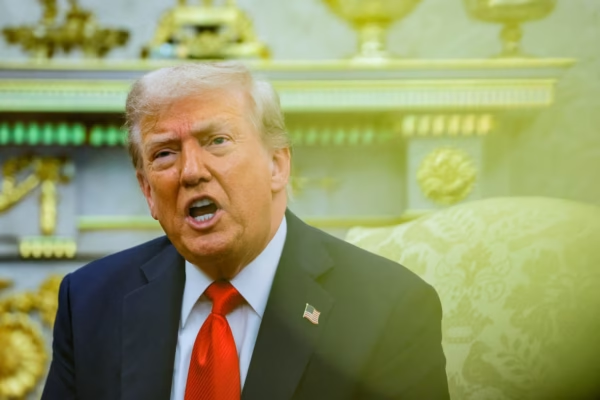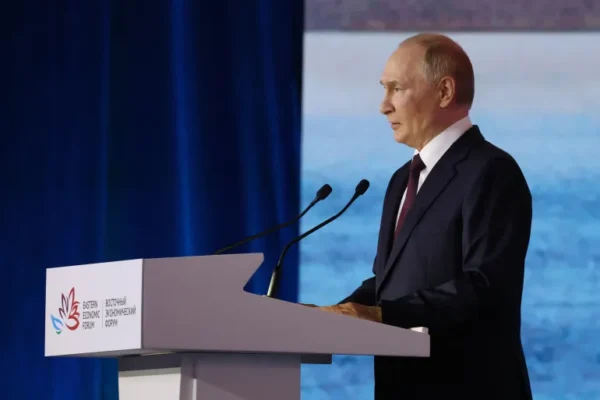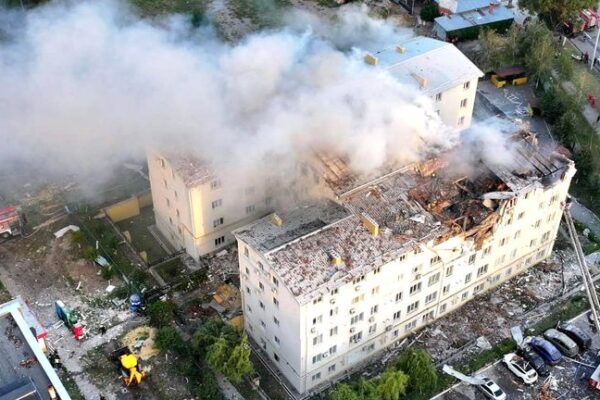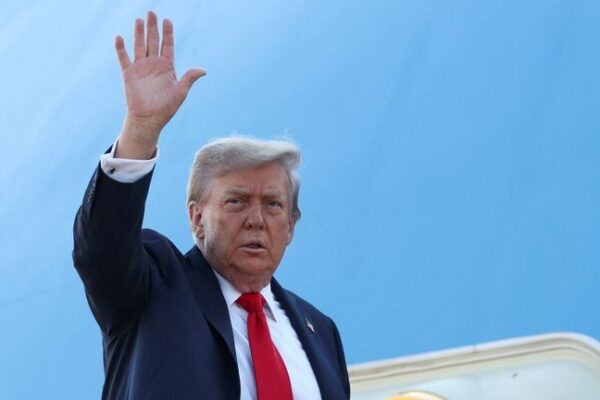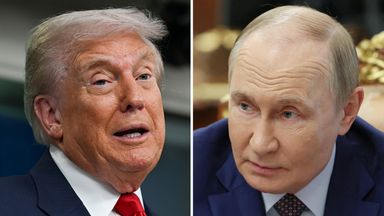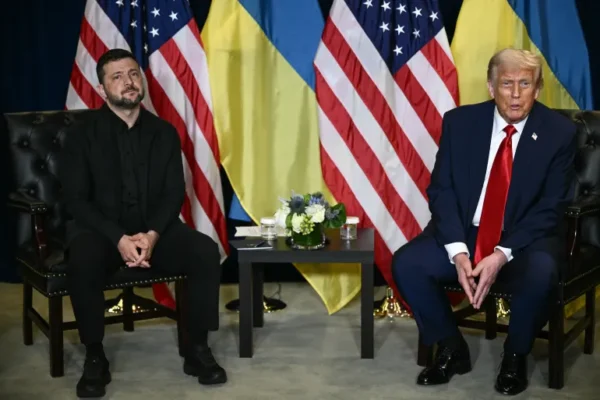
In Major Policy Shift, Trump Says Ukraine Can Reclaim All Territory from Russia
In a dramatic change of stance, U.S. President Donald Trump has declared that Ukraine can recover all of its territory seized by Russia since the 2022 invasion — a departure from his previous suggestions that both sides would need to compromise to end the war. Trump made the statement in a post on his Truth Social platform following a meeting with Ukrainian President Volodymyr Zelenskyy on the sidelines of the United Nations General Assembly. “With time, patience, and the financial support of Europe and NATO, returning to Ukraine’s original borders is very much an option,” Trump wrote. The statement marks a significant reversal from Trump’s earlier position, in which he suggested both Kyiv and Moscow would need to cede land to secure peace. That approach had been sharply rejected by Zelenskyy and most of Europe’s leaders. Criticism of Russia and Praise for Ukraine Trump appeared to take aim at Russia’s military effectiveness, stating that the war had been fought “aimlessly,” and claiming a “real military power” would have won in less than a week. He also called Russia a “paper tiger,” adding that President Vladimir Putin and the Russian economy are in “big trouble,” and urged Ukraine to take advantage of the moment. Despite previous skepticism about Ukraine’s chances and a public clash with Zelenskyy earlier this year, Trump struck a more supportive tone this week. “I have great respect for the fight that Ukraine is putting up. It’s pretty amazing, actually,” he said after the meeting. Zelenskyy: Trump Could Be a ‘Game-Changer’ Zelenskyy thanked Trump for what he called his “personal efforts to stop this war” and said the two had discussed post-war security guarantees for Ukraine. “We all understand that President Trump is ready to give Ukraine security guarantees after this war is finished,” Zelenskyy told reporters, adding that Trump’s leadership could be a “game-changer” in the conflict. Trump had previously opposed Ukraine’s membership in NATO and had insisted that Europe should play a larger role in arming Kyiv. But since taking office in January, he has positioned himself as a potential broker of peace — even promising during his campaign to end the war within 24 hours of becoming president. From Diplomacy to Deterrence Trump’s comments come amid rising tensions between Russia and NATO. When asked if NATO allies should shoot down Russian aircraft violating their airspace, Trump responded, “Yes, I do,” signaling support for a more assertive military posture. Earlier this week, Russian MiG-31 fighter jets violated Estonian airspace for 12 minutes, prompting Estonia to call for an emergency UN Security Council meeting and to consult NATO allies. Similar incidents involving Russian drones have been reported by Poland. NATO issued a firm warning Tuesday, pledging to use “all necessary military and nonmilitary tools” to defend member states and calling the airspace breaches “a pattern of increasingly irresponsible behaviour” by Moscow. Uncertainty Remains Around Putin Asked whether he still considered Putin a reliable negotiating partner, Trump was vague. “I’ll let you know in about a month from now, OK?” he said. Trump has frequently delayed decisions related to sanctions or new steps against Moscow, often citing personal diplomacy as a better path forward. Backdrop: A War in Stalemate Since the start of the full-scale invasion in February 2022, Russia has seized nearly 20% of Ukraine’s territory, including Crimea, which it annexed in 2014. The war has become Europe’s deadliest conflict since World War II, with both sides locked in a prolonged and grinding battle. Trump’s newly declared support for Ukraine’s full territorial recovery introduces a major shift in the U.S. position and could realign Western diplomatic and military strategies — depending on whether the administration backs rhetoric with action.


![Five Key Takeaways from Trump-Starmer Meeting in the UK Five Key Takeaways from Trump-Starmer Meeting in the UK Aylesbury, UK – September 18, 2025 — U.S. President Donald Trump and UK Prime Minister Keir Starmer presented a united front on major global issues during a joint press conference at Chequers, wrapping up Trump’s three-day visit to the United Kingdom. Despite recent tensions between Washington and European allies, the meeting underscored strong transatlantic ties as the two leaders discussed Ukraine, NATO, Gaza, Afghanistan, and more. 1. Trump Says Putin ‘Let Him Down’ Over Ukraine President Trump expressed frustration with Russian President Vladimir Putin over the prolonged war in Ukraine, admitting he underestimated the challenge of resolving the conflict. “I thought it would be easiest because of my relationship with President Putin, but he’s let me down,” Trump said. PM Starmer reiterated the UK’s commitment to supporting Ukraine, vowing to increase pressure on Russia and push for a lasting peace deal. 2. Divergence on Gaza, But Unity Against Hamas While both leaders condemned Hamas’s October 7, 2023 attack on Israel, they differed on the broader approach to the Gaza conflict. Trump avoided criticizing Israel’s ongoing military campaign, which has killed over 65,000 Palestinians, calling October 7 “one of the worst days in the history of humanity.” Starmer's previous pledge to recognize a Palestinian state was noted as a “point of disagreement,” but Trump praised the UK leader’s strong stance against Hamas. 3. Trump Praises NATO and Increased Defense Spending Once a vocal NATO critic, Trump struck a different tone, applauding the alliance’s commitment to boost defense spending. “I want to thank NATO and our wonderful head of NATO, Mark [Rutte]… They’ve done a great job,” he said, highlighting a new pledge for members to spend 5% of GDP on defense. Trump emphasized U.S. support in supplying weapons to NATO allies, stressing that the alliance was now “paying its fair share.” 4. Bagram Airbase Back in Focus Trump hinted at possible negotiations with the Taliban for the U.S. to regain access to the Bagram airbase in Afghanistan, which was vacated in 2021 during the Biden administration’s withdrawal. “We’re trying to get it back,” Trump said, citing its strategic location near China’s nuclear facilities. The Taliban, however, quickly dismissed the proposal, stating they welcome engagement with the U.S. but will not allow any foreign military presence. 5. Trump Weighs in on Kimmel Firing Trump also addressed the firing of late-night host Jimmy Kimmel by ABC, following political controversy over remarks involving conservative commentator Charlie Kirk. “Jimmy Kimmel was fired because he had bad ratings… He’s not a talented person,” Trump said, dismissing concerns about free speech and framing the firing as a business decision. Conclusion: The Trump-Starmer meeting reflected a broad effort to reinforce U.S.-UK ties amid ongoing global crises. While areas of disagreement remain, particularly on Middle East policy, both leaders signaled alignment on Ukraine, NATO, and global security cooperation.](https://trendbrio.com/wp-content/uploads/2025/09/USA-TRUMP-BRITAIN-AND-KEIR-STARMER-600x400.webp)

